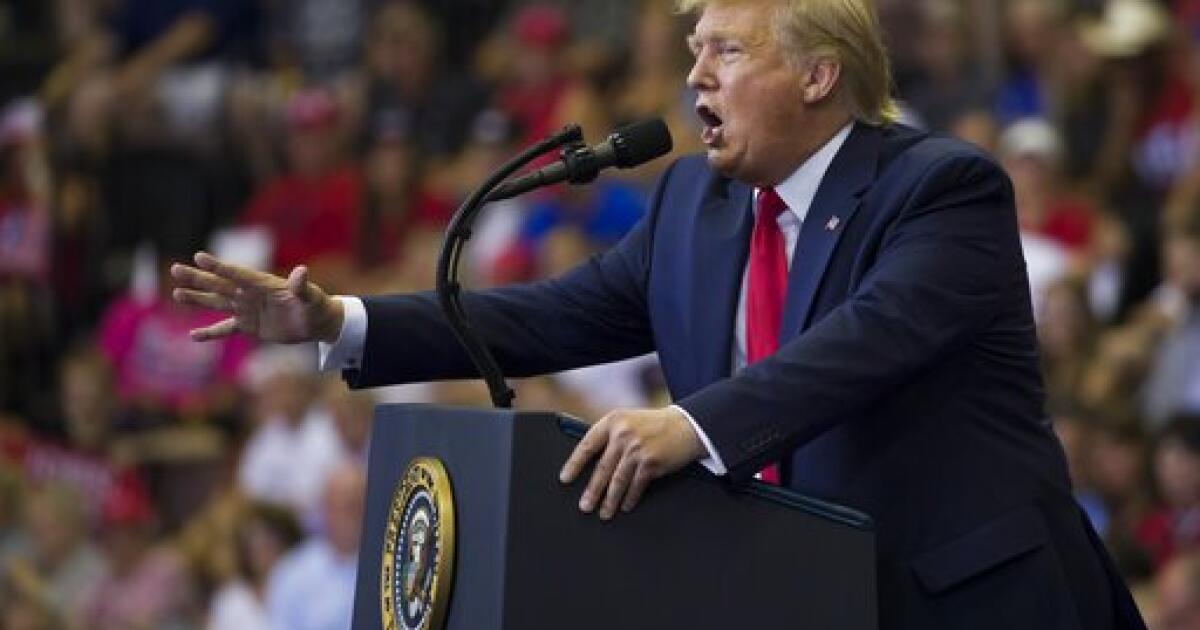If you’ve driven on the freeway in recent years, been to the grocery store, attended a movie or a live performance — heck, if you’ve been at all sentient — the findings of a new poll will startle you about as much as the sun rising at dawn and setting at dusk.
America has gotten ruder.
At least, that’s how a plurality of Americans perceive the tetchy state of our union.
A poll released this month by the nonpartisan Pew Research Center found that five years after the start of the COVID-19 pandemic many of those surveyed believe public behavior in the United States has changed for the worse.
Our politics surely have.
“Everything’s a war. Everything’s a battle. There’s no collaboration, no coordination, no civic pride,” said Don Sipple, a veteran communications strategist who helped shape campaign messages for George W. Bush, Arnold Schwarzenegger and Jerry Brown, among many others.
“Civic duty is just warfare,” Sipple continued. “And since Donald Trump entered the [presidential] race in 2015, it’s only gotten more corrosive and caustic.”
That’s what happens when you have a president with no filter, no conscience and a flamethrower where his mouth should be.
More on that in a moment.
The pandemic seems a good starting point to measure the foundering of America’s p’s and q’s, seeing as how it produced the equivalent of a national nervous breakdown and pried a deeply divided country even further apart.
The Pew survey found that just under half of U.S. adults polled — 47% — said the way people behave in public these days is ruder than before the pandemic. Two in 10 said today’s behavior is a lot ruder.
Some 44% of adults said public behavior is about the same; 9% said people are behaving a lot or a little more politely in public.
Those latter respondents have presumably been anesthetized, never set foot in the real world or live in a permanent, chemically induced stupor.
How do you — or, rather, how did the Pew researchers — measure rudeness? The behaviors they tested involved, among various trespasses, smoking, swearing and the use of technology around other people.
Of the eight actions mentioned in the survey, two drew the widest disapproval: 77% said it’s rarely or never acceptable to smoke around others and 74% said the same about taking a photo or video of someone without their permission.
About two-thirds of adults said it is rarely or never acceptable to bring a child to an adult venue, such as a bar or upscale restaurant; to visibly display swear words, such as on a T-shirt or sign; or to curse out loud in public.
Smaller majorities say it’s rarely or never acceptable to play music out loud or to wear headphones or earbuds while talking to someone. In both instances, a sizable number said it depends: Roughly a third said it’s sometimes OK to play music out loud, and about a quarter said that about wearing headphones while talking to someone.
The poll found the largest gap in perceived rudeness was between those of different ages.
Older adults were more likely than younger adults to consider it impolite to curse out loud, visibly display profanity or wear headphones or earbuds while talking to someone in person.
Strikingly, in an age when everything seems politicized there were not major differences in viewpoints based on respondents’ partisan affiliations. At the very least, Democrats and Republicans agree that wafting cigarette smoke in someone’s face and capturing their reaction on video — without first asking — is untoward.
Maybe there’s hope for the republic yet.
Not that you’d want to model the behavior of our boorish, foul-mouthed chief executive.
It seemed scandalous — and highly indecorous — back in 1992, when President George H.W. Bush referred to his Democratic rivals, Bill Clinton and Al Gore, as “two bozos.”
Bush felt obliged to apologize, as did his son George W., when he was seeking the White House eight years later and a hot mic caught him referring to one of the New York Times’ political correspondents as “a major league a—.”
It’s worth noting that indiscretion, however heartfelt, became public by accident. Bush didn’t bellow it out at a campaign rally.
Compare that with Trump’s casual profanity and the insults — “fat,” “ugly,” “scum,” “stupid,” “sleazebag,” “pencil neck,” “son of a bitch” — he regularly spews at opponents.
When he descended upon the Justice Department earlier this month to whine about the serial criminal cases he once faced, arguably the least shocking thing about Trump’s extraordinary, browbeating appearance was the presidential use of the profanity “bulls—” while in public.
“Donald Trump has been at the leading edge of changing the discourse norms of leadership in the presidency,” said Kathleen Hall Jamieson, a University of Pennsylvania expert on political communication and the author of extensive works on the subject. “I mean, he’s broken barriers never before broken.”
It’s hard to parse the degree to which politics shape culture and how much culture shapes our politics. As Jamieson noted, “We’re influenced by what we see around us. If I hear a lot of what we would traditionally mark off as uncivil discourse, it seems normal to me.”
Is it any surprise, then, that America has gotten ruder? Especially with the crassness and vulgarity routinely emanating from the nation’s ill-mannered chief executive?
Andrew Breitbart, the late conservative website publisher, famously suggested “politics is downstream from culture.” But it seems these days the waters have commingled, creating a pool that’s increasingly foul-smelling and polluted.
Like a fish, America’s manners have rotted from the top down. So, too, our political dialogue.
No wonder people hold their nose — and refuse to take their earbuds out.

